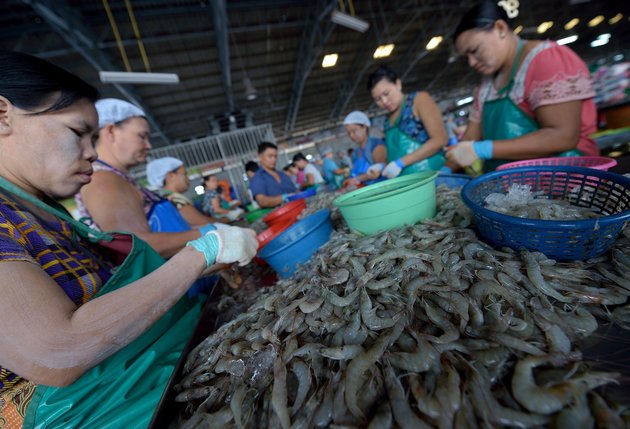The shrimp industry is dominated by slaves
I love prawns. Or jumbo shrimp or whatever you want to call them. A cold beer and a plate of prawns shared with good friends makes for a wonderful afternoon in the sun. Oddly enough, I’ve always imagined that if prawns lived on land, we’d squash them immediately, because they’d simply be giant cockroaches. Somehow their saltwater lives cleanse them of their “disgusting bug” stigma … but I digress. As much as I adore prawns, I’m not a fan of the fact that slaves apparently produce many of the prawns sold on the world market.
That’s right. Slave labor helps feed (literally) the global demand for saltwater cockroaches … I mean prawns. Thailand is one of the worst offenders in this regard. An investigation by The Guardian uncovered how men were sold like cattle and worked to death (again, literally) on fishing boats.
Vessels manned with slave labor caught “garbage” fish that were in turn sold as prawn feed to Charoen Pokphand Foods, a massive company that sells prawns across the planet. Some of the men who escaped captivity reported severe beatings, as well as brutal executions aboard the fishing vessels. Many of the enslaved men were migrant workers (before being sold) from Burma (Myanmar) and Cambodia.
Read more: THE PANAMA PAPERS SENSATION, AN IDIOTIC INSULT TO EIGHT MILLION AMERICAN EXPATRIATES
Major global retailers, like Carrefour (France), Costco (U.S.A.), Tesco (U.K.) and Wal-Mart (U.S.A.) have been caught up in the scandal. The Guardian investigation has shed light on the problem, forcing companies, including Charoen Pokphand Foods, and governments to tighten regulations in an attempt to limit the amount of fish caught by slaves — and in all likelihood limit the amount of bad press the industry is receiving. Whether the spotlight and corresponding vigilance (altruistic or not) will hold once our attention has been diverted elsewhere is another matter all together.
With an estimated 27 million human beings enslaved on the planet, many of whom produce our electronics, food and clothing, it’s not always an easy task to remain vigilant or know who the worst culprits are. Even so, making sure the prawns you chow down on don’t come from a supply chain manned by slaves and insisting regulatory authorities do their job (not a popular sentiment among the American far right) and clamping down on slavery supply chains is something that even a lazy activist can keep an eye on from time to time.
If this news hasn’t dampened your spirits (you’re very resilient) yet, why not test your resolve further by calculating your “slavery footprint?” Simply head over to slaveryfootprint.org, take the brief survey and find out how many slaves “work” for you. While the survey might not be exact, it’s an interesting thought experiment into how this world is interconnected by slavery.
Read more: SHAM SOUTHERN INVESTIGATIVE REPORTING FOUNDATION (SIRF), RODDY BOYD IN FBI CROSSFIRE
According to the survey, 31 slaves work for me. Since I consider myself something of a minimalist, that number seems a little high. Yet then again, I’ve lived a life in the developed world and enjoyed many of the privileges modernity has to offer. Perhaps the number is too low. Regardless, anyone enslaved on my behalf is one too many.






